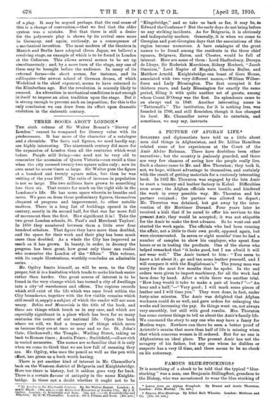A PICTURE OF AFGHAN LIFE.*
SOLDIERS and diplomatists have told us a little about men and things in Afghanistan, and Dr. Lillias Hamilton related some of her experiences at the Court of the Amir Abdur Rahman. There have doubtless been other narratives ; but the country is jealously guarded, and there are very few olia.nces of seeing how the people really live. Such a chance came to Mi. and Mrs. Thornton ; they took it, not, we hope, without advantage to themselves, and certainly with the result of getting materials for a curiously interesting book. In 180 Mr. Thornton was engaged by the late Amir to start a tannery and leather factory in Kabul. Difficulties soon arose ; the Afghan officials were hostile, and hindered the work in every possible way. Mr. Thornton and his partner resigned ; the partner was allowed to depart ; Mr. Thornton was detained, but got away by the inter- vention of Sir Mortimer Durand. Four years later he `received a hint that if be cared to offer his services to the present Amir, they would be accepted; it was not etiquette for the Amir to make the first advance. So he went out and started the work again. The officials who had been running the affair, not a little to their own profit, opposed again, but were circumvented. In seven or eight months' time he had a number of samples to show his employer, who spent four hours or so in testing the products. One of the slaves who helped remarked that " it looks good, but I am afraid it will not wear well." The Amir turned to him : " Yon seem to know a lot about it ; go and tan some leather yourself, and I will compare it with the Englishman's." The young man was sorry for the next few months that he spoke. In the end orders were given to import machinery, for all the work had been done by hand. After a while there was another trial. " How long would it take to make a pair of boots P "—" An hour and a half."—" Very good ; I will mark some pieces of leather and I will time you." They were done, in fact, under forty-nine minutes. The Amir was delighted that Afghan workmen could do so well, and gave orders for enlarging the works and increasing the pay. So things went on, not always very smoothly, but still with good results. Mrs. Thornton has some curious things to tell us about the Amir's family life. We commend the story to any one who may have a fancy for Moslem ways. Nowhere can there be seen a better proof of Aristotle's maxim that more than half of life is missing when that which concerns women is ill ordered. But for no one is Afghanistan an ideal place. The present Amir has not the savagery of his father, but any one whom he dislikes or suspects- has a very in time, and there seems to be no check on his autocracy.














































 Previous page
Previous page